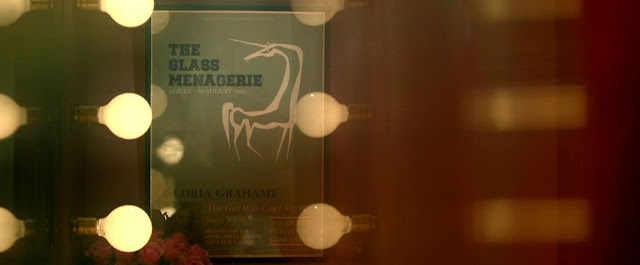Annette Bening as Gloria Grahame, 2017:
"...You want to leave me? People have been walking out on me my whole life, honey..."
Meena Kumari:
"Badi Bechari Hai
Meena Kumari
Jisko Lagi Hai
Dil Ki Bimari" (quoted in Vinod Mehta's 'Meena Kumari: The Classic Biography', 1972/2013)
'
Film Stars Don't Die in Liverpool', २०१७ हा अतिशय चांगला चित्रपट नुकताच पहिला. ग्लोरिया ग्रॅहम (
Gloria Grahame) १९२३-१९८१ यांच्या जीवनावर तो आधारित आहे.
अॅनेट बेनिंग (Annette Bening) यांचा उत्कृष्ट अभिनय हे या सिनेमाचे सर्वात मोठे वैशिष्ट्य म्हणता येईल.
(मोठे करून पहा : त्यात लिहले आहे : The Girl Who Can't Say No)
सौजन्य : Lionsgate (UK) and Sony Pictures Classics (USA)
तो पाहत असताना स्व. मीना कुमारींची (१९३३-१९७२) आठवण येत राहिली.
दोघीही महान अभिनेत्र्या.... दोघींबद्दल निंफोमॅनियाक हे विशेषण वापरल गेलेल... काही असो, दोघी प्रेमाला भुकेल्या...
सिनेमा बघून हेही वाटल: मीना कुमारींच्या जीवनावर या दर्जाचा सिनेमा हिंदीत कधी निघेल का?
Gaby Wood, LRB, March 2018:
"...Ray would
go on to say of his marriage to Grahame: ‘I didn’t like her very much. I was
infatuated with her, but I didn’t like her very much.’ As if in homage to Ray’s
dislike, his biographer Patrick McGilligan refers to Grahame several times as a
‘sexy blonde actress’, and writes that ‘many of those who knew Grahame
considered her a nymphomaniac.’ It wasn’t just those who knew her. In Peter
Turner’s succinct, sad memoir, Film Stars Don’t Die in Liverpool
(recently made into a film with an uncanny Annette Bening in the lead), Grahame
is a washed-up Hollywood star about to die of cancer – but hers is a
complicated decrepitude. Hair matted, make-up mouldering, asking to be ‘burped’
like a baby, she is even so billed in British repertory theatres as ‘the girl
who can’t say no’..."
Vinod Mehta, ‘Lucknow Boy: A Memoir’, 2011:
“....Was Meena Kumari, as rumoured, a nymphomaniac? The word
denotes ‘uncontrolled sexual desire in a woman’. I could come to no definite
conclusion on the issue which the publishers were very keen for me to
investigate. All I found was that she was widely believed to have slept around.
Ashok Kumar, Rajendra Kumar, Raaj Kumar, Dharmendra, Sawan Kumar and several
others allegedly received her favours after she had had a quarter bottle of her
favourite brandy.
I was told about one admirer she fornicated with casually
who thought he had a good thing going. After a night of satisfactory
lovemaking, he knocked the next afternoon on the door of her make-up room,
‘Kaun?’ (who?), asked the lady. The admirer gave his name. She again asked,
‘Kaun?’ The admirer again gave his name, this time providing more details,
reminding the actress of their union the previous night. ‘Raat gayi, baat gayi’
(The night has gone, so has the matter), she answered nonchalantly.
I do not know whether it is true today, but in the ’70s
there was a battery of hangers-on attached to a star. They could be distant
relatives, secretaries, legal counsels, hairdressers, brothers-in-law,
chauffeurs, etc. These people’s fantasies of making it big courtesy the star
were at once sad and gripping. The fantasists were, happily, a valuable source
of classified information, which helped me reconstruct Meena Kumari’s life. To
be sure, they would crazily exaggerate their importance, influence and
proximity to the star. One hanger-on invited me to inspect a secret bedchamber,
with lots of mirrors, tucked away in his office. This is where he claimed he
serviced the actress...”


No comments:
Post a Comment